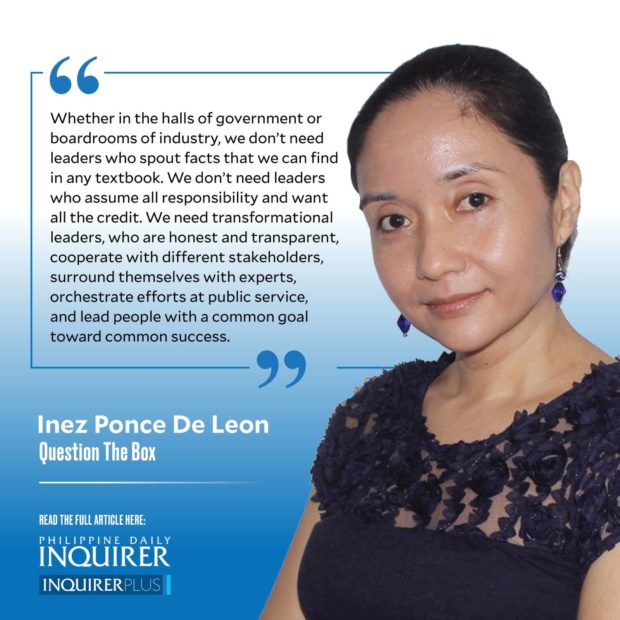No exam for good leadership
When I was a baby science communication scholar running around in my academic diapers, I thought that facts were everything. I once believed that we simply needed to feed people the right information (dressed up all pretty) so that they would make the right decisions.
I have long since learned that this approach to science communication is outdated and ineffective: It disregards the context that surrounds facts, ignores the diversity of our multiple publics, and rests on a narrow definition of citizenship.
Still, we need to test young students by asking them to repeat information from a textbook, recite events from history, or choose the right letter on a test. All these constitute a form of memorization.
As we age, we also need to move beyond memorization of facts. Bloom’s Taxonomy, which guides educators everywhere, places memorization at the lowest level of cognition. After students remember information, they must understand what it means, apply it in different settings, analyze it, critically appraise it; and finally, at the highest level of cognition, create new things or articulate new ideas that challenge how we see the world.
It is not knowledge of facts that matters; rather, it is the ability to remember and the ability to move up to more challenging levels of cognition that are required in a complex, chaotic world. For example, some people might get the facts wrong, but they can analyze, think critically, and accept corrections and critique (such a precious skill in today’s media environment!). They are still better off than those who have all the facts, but cannot accommodate new knowledge, apply new information, or articulate their insights.
Granted, some professions require standardized tests; but while these tests assess knowledge, they do not always assess actual ability. Professionals must still prove their worth in real-world situations that require their expertise.
All these came to mind last week, when a post circulated online, this time written by a Person from the Academic Community (hereafter referred to as PAC, as I do not want to repeat his name or give him any more traction). The post mentioned how Vice President Leni Robredo once said that the Philippines had 1,700 islands; IV needles are inserted into nerves; 40×4=1600; and the destructive force of floodwaters is due to strong electric current.
PAC asked his followers: setting aside that VP Leni is not a thief and has a good public service record, would you hire someone who had these “facts” if they were applying to be a leader in your company?
I will not correct the “factual” basis of what the VP supposedly said. Instead, I will criticize PAC, who represents the arrogance of those who use their higher degrees to reduce leadership to mere trivia.
Had VP Leni gotten the facts straight, would her actions have been any different? That is, if she had said the right things, would she have written a different policy, made a different program, acted differently? Based on her track record, she still helped marginalized families get gainful employment, brought aid to different regions regardless of their loyalty to her, and distributed COVID-19 home care kits long before the government ever thought of making one. No standardized test could have measured these.
In focusing on the “wrong facts,” moreover, PAC ignored the very characteristics that we have long been searching for, and should value, in our leaders: integrity, service, dignity, and grit.
Whether in the halls of government or boardrooms of industry, we don’t need leaders who spout facts that we can find in any textbook. We don’t need leaders who assume all responsibility and want all the credit. We need transformational leaders, who are honest and transparent, cooperate with different stakeholders, surround themselves with experts, orchestrate efforts at public service, and lead people with a common goal toward common success.
Knowing the number of islands in an archipelago, nerves from veins, and the physics of floods tell me nothing about a person’s values. Laughing at such mistakes, however, tells me that PAC is obsessed with right answers in an invisible examination in the real world—and therefore has a shallow understanding of education, the nature of knowledge, and the role of a true leader.
—————-
iponcedeleon@ateneo.edu





















